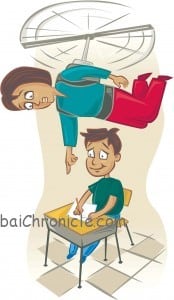Most parents, in particularly in Dubai, often try to do anything to help their children be happy and succeed with their education and professional career. But a recent study says that college students who have over protective parents, or also known as helicopter parents, often show signs of depression and anxiety.
 Too much involvement in youth’s lives can have negative effect, according to the new research by Holly Schiffrin and her team from the University of Mary Washington. It seems college students with helicopter parents are more likely to be depressed and less satisfied with their lives. The researchers examined the effect of parents’ behavoiur on the psychological state of college students. Nearly 300 American undergraduate students aged between 18 and 23 years took part in the online survey and answered questions about their mothers’ behavoiurs. They also were asked to rate their own autonomy and competence, as well as to describe how well they can communicate with other people. The levels of anxiety, depression and overall satisfaction with life were assessed by the researchers, and the results showed a connection between the over controlling parenting and negative effects on the students well-being.
Too much involvement in youth’s lives can have negative effect, according to the new research by Holly Schiffrin and her team from the University of Mary Washington. It seems college students with helicopter parents are more likely to be depressed and less satisfied with their lives. The researchers examined the effect of parents’ behavoiur on the psychological state of college students. Nearly 300 American undergraduate students aged between 18 and 23 years took part in the online survey and answered questions about their mothers’ behavoiurs. They also were asked to rate their own autonomy and competence, as well as to describe how well they can communicate with other people. The levels of anxiety, depression and overall satisfaction with life were assessed by the researchers, and the results showed a connection between the over controlling parenting and negative effects on the students well-being.
The so-called helicopter parenting behaviours were linked to decreased satisfaction with life and higher levels of depression. The children of such parents were also feeling less autonomous and competent, and couldn’t get along with other people as well. And students who perceived themselves as less independent were more likely to exhibit symptoms of depression.
The researchers of the online survey, published in the Journal of Child and Family Studies, concluded that even though parents truly believe they are being supportive and doing their best to raise and help their children, this helicopter parenting has negative outcomes for children. The intensive involvement and controlling methods are actually felt by children as undermining and over controlling. As children grow up, their need for independency also grows, so parents should slowly back away and allow the young adults feel more autonomous and free.




































